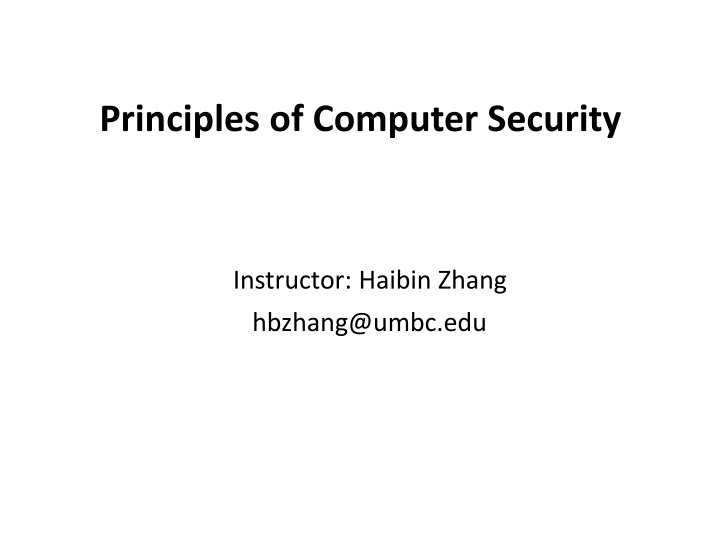
Computer Security Principles and Topics Overview
Explore the principles and topics covered in the computer security course instructed by Dr. Haibin Zhang at UMBC. Topics include security policies, cryptography, cloud computing, hardware security, ethics, and more. Learn about modern cryptographic methods, intrusion detection, network security, and the importance of ethical practices in computer security.
Download Presentation

Please find below an Image/Link to download the presentation.
The content on the website is provided AS IS for your information and personal use only. It may not be sold, licensed, or shared on other websites without obtaining consent from the author. If you encounter any issues during the download, it is possible that the publisher has removed the file from their server.
You are allowed to download the files provided on this website for personal or commercial use, subject to the condition that they are used lawfully. All files are the property of their respective owners.
The content on the website is provided AS IS for your information and personal use only. It may not be sold, licensed, or shared on other websites without obtaining consent from the author.
E N D
Presentation Transcript
Principles of Computer Security Instructor: Haibin Zhang hbzhang@umbc.edu
Course Info Time: TuTh 11:30am - 12:45pm Place: Janet & Walter Sondheim 114 Instructor: Dr. Haibin Zhang Instructor office: ITE 357 Email: hbzhang at umbc dot edu Office Hours: Tuesday 2pm-4pm (Works for everyone?) TA: Shantanu Hirlekar hs11 at umbc dot edu
Self-Introduction Name Research interests/Labs/Advisor, etc Hobbies Optional: What do you expect from this course? Or: What security topics do you like most?
Evaluation See website I expect that some research projects could lead to interesting paper submissions
Ethics/Warning Do NOT undertake any attacks learned in the course. The existence of a security vulnerability is not an excuse. Please obey UMBC policy and state/federal law.
Topics Security policies: confidentiality, integrity, availability, accountability, etc. Modern cryptography Cryptographic engineering Systems and distributed systems basics Cloud computing and cloud security Software defined networking and its security Hardware security Introduction to computer security
Topics, Cont. Intrusion detection Privacy and anonymity Blockchains (permissioned and permissionless) security Ethics in computer security Network security
Overview of Topics So that you have a big picture about this course The topics subject to change Case studies
Approach Goals = Security policies Trust/Adversary: All about assumptions Mechanisms Formal security approach that everyone should take For each subfield, they are slightly different
Modern Crypto Popular; hard, if not impossible, to ignore as a security method Building on topic of computational complexity and probability Reduction based modern crypto Can crypto do everything? We only need cryptographers!
Modern Crypto Symmetric cryptography Asymmetric cryptography Advanced topics Learning to prove things in cryptography Homework on proofs
Cryptographic Engineering Building a system using crypto Rather different from crypto Lab on crypto engineering
Systems Security A huge topic
System Basics Modern computer architecture We need to work on real systems so that it is more secure Even if you design your own systems, it is still good to learn modern systems Functionalities and reliability should come first I would not possibly cover all. The best approach is through case studies.
Cloud Computing and Cloud Security AWS EC2 OpenStack
Intrusion-Tolerant SDN and Neutron Centralized controller Simple, powerful, programmable, flexible A single of failure
Hardware Security PUF: physical unclonable function Intel SGX (Your computer has one) Oblivious RAM
Network Security IPSec,PGP, SSH, SSL Tor
Intrusion Detection Anomaly based Signature based Specification based Bro
Proactive Security Nodes (secret shares) Trusted Hardware/OS
Permissionless Blochains Bitcoin, Ethereum, ZeroCash
Permissioned Blockchains Gaining popularity
Cyber Physical Systems Security Faulty/malicious Sensors/data providers Correct A C aggregator client
Storage and Storage Security Replication-based Erasure coding based Secure deduplication Linearizability
A System that Has All Desirable Features? Confidentiality Integrity Availability
How does Evaluation Look Like? Throughput LAN WAN
Evaluation Scalability (in LAN)
Take-Home Advice Make good use of my office hours Class discussion is important Do not expect us to debug for your systems (Doing it yourself is part of system studies.) Adjust your research project idea Plan early and do the project
